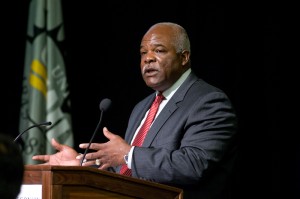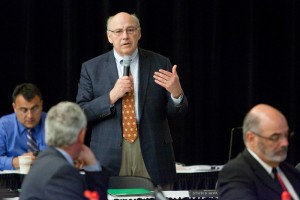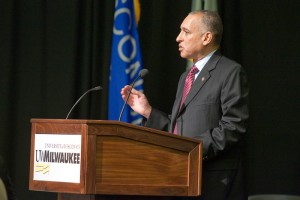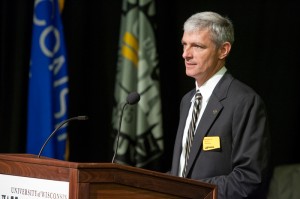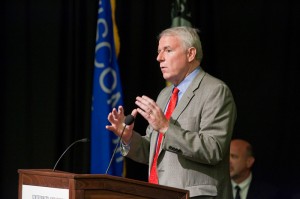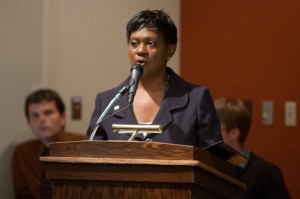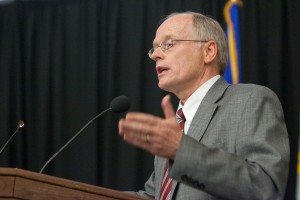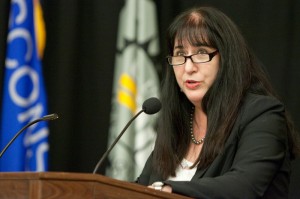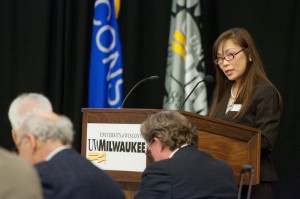MILWAUKEE – University of Wisconsin System President Kevin P. Reilly told the Board of Regents Thursday that the new leadership flexibilities proposed for all UW institutions are “the most significant set of changes we’ve seen in the UW System since it was created 40 years ago.”
“Gov. Walker showed us that he is willing to consider bold changes, and that he recognizes UW’s unique needs. Building on that original proposal, legislators worked to improve this budget in ways that would benefit all UW institutions and preserve the System,” Reilly said.
Michael Morgan, Senior Vice President for Administration and Fiscal Affairs, provided Regents with an overview of the omnibus amendment to the 2011-13 budget put forth last week by the Joint Finance Committee. That amendment provides all UW institutions with new leadership flexibilities as called for in the UW System’s Wisconsin Idea Partnership, addressing budgeting, financial management, personnel, and purchasing.
- See UW System PowerPoint presentation on the
- See the about the amended UW System budget
However, while the prospect of flexibilities is promising, UW-Madison Provost Paul DeLuca called new provisions in the budget that call for UW to cease involvement with WiscNet “the largest threat I’ve seen to our enterprise since I’ve been here.” DeLuca said such broadband access is critical to the university’s research and scholarship enterprises.
WiscNet is a nonprofit consortium that serves all UW campuses, hundreds of K-12 schools, hospitals, technical colleges, private colleges, and other members. The same budget provisions also threaten several grant-funded partnerships, including the Metropolitan Unified Fiber Network project led by UW-Madison and the Building Community Capacity through Broadband project led by UW-Extension.
UW-Madison Vice-Chancellor Darrell Bazzell called the broadband amendments “unexpected and surprising.” “It’s really difficult to overstate the potential negative implications…on our billion-dollar research enterprise at UW-Madison,” Bazzell said. “This amendment could, and perhaps would, render our research impossible…”
Bazzell and DeLuca cited the Antarctic IceCube project, the Great Lakes Bioenergy Research Center, and the Large Hadron Collider project in Switzerland as three significant research grants that could be imperiled. “It’s vital that we find a way to reverse the potentially harmful effects of this legislation,” he said.
Chancellor Ray Cross, from UW-Extension and UW Colleges, expressed similar concerns. “If this passes, it will dramatically reduce high speed broadband access in Wisconsin communities and dramatically increase our cost. It also will limit economic development because most future economic development is centered about high speed data,” Cross said.
Reilly suggested that legislators likely did not fully understand the implications of the amendments related to broadband. The Board unanimously voted to oppose the broadband-related provisions.
Regent David Walsh, asking how the current cuts in state funding for the university compared to previous cuts, pointed out that, unlike before, tuition adjustments are not now available to offset the impact of the cuts.
Regent Aaron Wingad, a recent graduate of UW-Eau Claire, urged the Board to continue working with students on tuition decisions. Reilly noted that tuition is one of the issues to be addressed by the proposed task force.
UW-Milwaukee looking to future with confidence
UW-Milwaukee Chancellor Mike Lovell opened Thursday’s meeting, telling the full Board that UW-Milwaukee and its partnerships in the community work to their mutual benefit and are building a stronger Milwaukee. These efforts are embodied in the university’s new tagline, “Powerful ideas, proven results.”
“Now more than ever, to maintain the growth and the path that we’re on … we need investment,” Lovell said.
Lovell pointed to the university’s 27% increase in enrollment and 37% increase in degrees granted over the past decade. At the same time, he said, research expenditures at UWM are now $75 million, up from $21 million in 2000.
- See UWM PowerPoint
Tom Barrett, Mayor of Milwaukee, told Regents that UWM’s new School of Public Health and the School of Freshwater Science are excellent examples of the university and the greater community coming together in a positive way. “These two schools together are really going to be a launching pad for even more great things in Milwaukee and the state,” Barrett said.
Michael Andrew, Director of Government Affairs and External Communications at Johnson Controls, credited Lovell with bringing “a renaissance” to the campus. Andrew said the collaborative relationship between UWM and Johnson Controls help to establish Wisconsin and the UW System as a center of R&D excellence for electrical energy storage systems. He said UWM provides a “stable recruiting pipeline for Johnson Controls to access world-class technical talent.”
Peggy Troy, President and CEO of Children’s Hospital and Health System, told Regents that their collaborations with UWM play a key role in turning around the city’s health challenges. She said the partnerships between heart surgeons and the biomechanical engineering department in developing mechanical hearts, for example, illustrate potential opportunities to “really change the landscape of children’s healthcare.”
Rich Meeusen, Chairman, President, and CEO of Badger Meter and Chairman of the Milwaukee 7 Water Council, told Regents that Southeast Wisconsin’s high concentration of water technology expertise both at UWM and in the business community present a unique opportunity. He said smart CEOs relocate their businesses for two reasons – synergy and talent – and the Milwaukee area has both. “UWM is a vital part of that pipeline,” he said.
At the joint meeting of the Capital Planning and Budget Committee and the Business, Finance, and Audit Committee, Christy L. Brown, UWM Vice Chancellor for Finance and Administrative Affairs, presented an overview of the .
A number of the projects that are part of the master plan are currently underway, and Brown showed overviews and architectural renderings of planned development over the next five years.
The $20-million purchase of the former Columbia St. Mary’s campus was completed in December 2010. Plans are underway to move the UWM Children’s Center and Honors College to this “Northwest Quadrant” location, as well as establishing temporary office space there. This was a “strategic opportunity to expand campus, facilities, and parking,” Brown said.
She reported that work is also underway on the new downtown School of Public Health, adding 23,000 square feet to an existing building. The master plan identified the downtown site as place for potential partnerships with MATC, MSOE and private health care providers such as Aurora Healthcare. “As the chancellor points out, this is part of the outreach mission of UWM,” said Brown.
The School of Freshwater Sciences addition will be located on the lakefront near downtown. Architect Robert Barr of Continuum Architects and Planners showed some of the early design stages of the site, located in the heart of Milwaukee’s industrial past.
Regent Womack asked if UWM School of Architecture and Urban Planning was involved in any of the master plan projects. Barr noted that students have been involved in an ongoing project to revitalize the harbor area, and the Freshwater Sciences building would be a cornerstone of redevelopment of the area.
Planning is also well underway on the Kenwood Interdisciplinary Research Center, which will provide facilities and equipment to not only help faculty compete for research funding, but to encourage collaborative research. David Black, Flad Architects, addressed the $75 million project – a great “first step” to accommodate research taking place at this university.
Bruce Block, chairman, UWM Real Estate Foundation noted that Innovation Park, another UWM project is “truly a public/private initiative.” Players involved in the project are private philanthropy, the City of Wauwatosa TIF District, the federal government and the State of Wisconsin.
In a separate presentation to the Education Committee, Interim Provost Johannes Britz highlighted the Digital Future initiative, as part of his presentation, “ .”
The initiative is an ongoing campus conversation about how the university can adapt to new and emerging technologies in three key areas: teaching and learning, research, and university operations and services. Digital Future planners will be seeking campus input on the recommendations this summer and fall, and then will conduct a financial analysis to develop a priority list.
As part of the same presentation, Patrice Petro, Vice Provost for International Education, highlighted the . Petro reported that UWM’s international programs and partnerships are growing. She noted that enrollment in the university’s 14 world-language programs has grown 57 percent since 2000. The College of Engineering and Applied Science also has developed and piloted an international cooperative education program with Chongqing University in China to serve as a model for preparing students to work in global and multicultural environments.
Regent Judith Crain told Petro, “That was really exciting,” and indicated she’s ready to sign up for Global Studies.
Education Committee
Education Committee approves B.A.A.S. and revised mission for UW Colleges
The Education Committee held the second readings of the Bachelor of Applied Arts and Sciences (B.A.A.S.) and revised mission for the UW Colleges, and approved both. The matter will come before the full Board on Friday.
The B.A.A.S. is a degree-completion program designed to create a new pathway through the UW Colleges for place-bound, underserved adult learners to obtain a bachelor’s degree and contribute to local workplace and community needs. The B.A.A.S. will be offered regionally on six of the 13 UW Colleges campuses (UW-Baraboo/Sauk County, UW-Barron County, UW-Marshfield/Wood County, UW-Richland, UW-Rock County, and UW-Waukesha) and in partnership with six UW System comprehensive universities (UW-La Crosse, UW-Parkside, UW-Platteville, UW-Stevens Point, UW-Stout, and UW-Superior).
Greg Lampe, UW Colleges Provost and Vice Chancellor for Academic Affairs, called the degree relevant, timely, and one that meets both local and individual needs. He added that it balances the Colleges’ traditional transfer mission within the system and the mission to provide a single degree geared to place-bound students.
UW-Parkside Chancellor Debbie Ford spoke in support of the B.A.A.S. degree, adding that her campus is already working to align efforts with the two-year UW-Waukesha campus. “We’re excited about this opportunity to help place-bound adults,” Ford said.
UW-Stevens Point Provost Mark Nook noted that three years ago, he was not in favor of the proposed degree, but has changed his mind. He called the degree “cost effective and efficient.” “I think this is going to be a very effective program for us,” he said.
Committee recommends revised transfer policy
The Education Committee voted to approve revisions to the UW System’s transfer policies, updating those policies to better align with UW System’s More Graduates for Wisconsin initiative and other Growth Agenda goals.
The revised policies also better reflect the current transfer environment, and improve the clarity and organization of the documents.
Among the changes, the section on admission practices for transfer students was significantly revised to align with UW System Freshmen Admissions Policy, so that transfer admission will be based on a comprehensive admission review, consistent with freshman admission.
The underlying goals of the revisions are to make undergraduate transfer in the UW System as student-centered a process as possible by fostering educational attainment, accommodating student mobility, and providing for the equitable treatment of transfer and continuing students, while at the same time respecting institutional autonomy and the differences among educational institutions.
Associate Vice President Heather Kim provided an overview of the UW System’s transfer data. She reported that more than 17,000 students successfully transferred into or within the UW System in 2009-10. Overall second-year retention rates among transfer students was 74%, with transfers from UW Colleges posting the highest second-year retention rate, at 81%.
She also noted that transfer students of color, excluding Asians, had noticeably lower two-year retention rates and lower six-year graduation rates than their white peers.
- See the UW System PowerPoint on
Senior Vice President Rebecca Martin also reported on the Transfer Equity Study, a two-year collaboration between the UW System, the Wisconsin Technical College System, and partner campuses for each system, which took a closer look at the inequities in transfer outcomes for students of color.
Key findings of the review included insufficient systematic monitoring and accountability of transfer outcomes, a need for a more “transfer-centric” campus culture, and the challenges that exist with technical program articulation and bachelor’s programs.
- See the UW System PowerPoint on the
Committee recommends approval of new academic programs
The Committee approved seven new academic programs, two of which are collaborative and five which will be offered entirely online. The new programs include: the Bachelor of Professional Studies in Organizational Leadership and Communication at UW-Eau Claire; Bachelor of Business Administration in International Business at UW-Eau Claire; the collaborative Bachelor of Arts in Japanese Studies at UW-Oshkosh and UW-Whitewater; the Collaborative Online Bachelor of Science in Health and Wellness Management at UW-La Crosse, UW-River Falls, UW-Stevens Point, and UW-Superior; the Online Master of Science in Organizational Change Leadership at UW-Platteville; the Online Master of Science in Integrated Supply Chain Management at UW-Platteville; and the Online Master of Science in Distance Education Leadership at UW-Platteville.
In other business, the Education Committee:
- Approved the 2011-12 proffer from the Trustees of the William F. Vilas Trust Estate in support of scholarships, fellowships, professorships and special programs in arts and humanities, social sciences, and music at UW-Madison and UW-Milwaukee;
- Approved the removal from the Regent Policy Documents (RPDs) of 14-1, addressing “Nondiscrimination in Oratorical Contests;”
- Heard a report from Senior Vice President Rebecca Martin;
- Accepted the annual Report on Promotions and Tenure Designations;
- Heard an update on the U.S. Department of Education’s new rules on Program Integrity, which impose a set of requirements on all states concerning their distance education degree program offerings to students; and
- Heard from the UW Colleges and UW-Extension on their newly developed Inclusive Excellence framework.
Business, Finance, and Audit Committee
Dr. Maliyakal John, WiSys Managing Director, presented the first Annual Report on the activities of the Wisconsin Small Company Advancement Program (WiSCAP) to foster technology transfer activity between UW System comprehensive institutions and small private sector businesses.
The objective of WiSCAP is to fulfill the unmet research and development needs of small companies by connecting them to the underutilized technical expertise of comprehensive campus faculty and students.
The state allocated $2 million to WiSCAP to be spent by June 2012 to support R&D projects important for small Wisconsin companies. Through 2010, eight projects have been approved with approximately $670,000 in funding allocated.
John noted that discussions have been conducted with over two dozen Wisconsin companies since 2010 regarding potential projects, intellectual property, marketing and revenue distribution.
Overall, John said, WiSCAP is off to a robust start, engaging campuses and companies from all over the state. The projects are high-tech with significant market potential and will be beneficial to the people and companies of Wisconsin. WiSys is confident of successfully completing the initiative in 2011.
“WiSCAP is partnering with small companies, which leads to job creation. Many of these are high-tech companies that lack capacity to conduct high-level research on their own. Also, we’re meeting our other objective of providing internship opportunities for students to engage in research,” said John.
Other speakers were Dr. John Ejnik, Assistant Professor of Chemistry at UW-Whitewater, and Daniel Neuman, President of Creative Culinary Solutions, based in Hartland, WI. They discussed their work addressing the problem of reducing the level of mercury circulating in the environment and affecting fish consumption.
John pointed out that the university and private industry both gain from this program.
Federal Update
Kris Andrews, UW System Assistant Vice-President for Federal Relations, provided Regents with an overview of federal priorities for UW System institutions in the coming 2011-12 fiscal year.
Andrews reported that a gap of $11-12 billion is inevitable in the Pell Grant program for 2012-2013, and efforts continue to find a way to reduce spending without hurting students.
She also noted that for the past 10 years, federal funding trends indicate that UW System campuses, excluding UW-Madison, have had a yearly average growth rate of 7%. She said UW campuses have received an overall 93% increase in federal funding in the past 10 years, with several institutions more than doubling over that period. UW-Madison experienced an average growth rate of 10% while also more than doubling over this period.
Paige Reed, Senior System Legal Counsel, also provided Regents with a summary of Federal Program Integrity Regulations recently promulgated by the U.S. Department of Education. She reported that effective July 1, 2011, compliance with these new regulations is required of all postsecondary institutions participating in Title IV student aid programs. While primarily intended to crack down on perceived abuses at some proprietary schools, the regulations have significant impact on all postsecondary institutions – including UW System institutions.
For example, the regulations require a complaint process to be in place, and UW System has been working on creating a complaint process that, with the governor’s support, would be specific to UW System institutions. Also, these regulations require that an institution be compliant with the distance learning/correspondence course regulations (if they exist) in a student’s own state.
Michael Falbo requested figures on how many UW System students are enrolled in distance learning, and how many states are involved. Paige responded that there are students from all 50 states enrolled in UW System online classes.
UW System Associate Vice President for Budget and Planning Freda Harris
Freda Harris presented information on the distribution of State-mandated budget cuts among UW System institutions based on the latest information available from the State budget process.
“The long and short of it is that we are still working on the distribution of reductions,” said Harris.
Senior Vice President’s Report
Senior Vice President for Administration and Fiscal Affairs Michael Morgan gave a status update on the Human Resource System (HRS) project, indicating that the project continues to be on time and within budget.
In other business, the Business, Finance & Audit Committee:
- Approved a resolution delegating authority to appoint and set the salary of several very specific titles from the UW System President to the respective Chancellors overseeing these areas. Examples include the State Geologist and the Director of the State Lab of Hygiene. The resolution similarly delegates authority to approve named professorships and extensions of non-medical leaves of absence beyond five years;
- Approved a clinical trial agreement between the UW-Madison and Pharmacyclics, Inc.;
- Heard a Quarterly Report of Gifts, Grants, and Contracts (3rd Quarter). Total receipts over the period were $1,176,463,382 – a decrease of $60,639,063 compared to the prior fiscal year; and
- Approved the annual budget of $5.2 million for HRS implementation plan in FY2012.
Capital Planning and Budget Committee
Associate Vice President David Miller reported that the Building Commission approved about $14 million for projects at its April and May meetings. The funding for those projects is approximately $1 million General Fund Supported Borrowing, $5 million Program Revenue, and $8 million Gift Funds.
Miller also reported that at the April Building Commission meeting, the Governor presented the 2010 Design and Construction Awards which recognize excellence in state building projects.
The award for Excellence in Architectural Design was presented to Workshop Architects, Milwaukee, for the UW-Superior Yellow Jacket Union project.
The Excellence in Engineering Design award was given to Ayres and Associates, Eau Claire, for the Lower Campus Steam Loop project at UW-Eau Claire. The Excellence in Sustainable Design award was presented to KEE Architecture, Madison, for the UW-Oshkosh Elmwood Center remodeling project.
Miller reported that the 2011-13 Capital Budget was passed by the legislature’s Joint Finance Committee as recommended by the State Building Commission. The budget fully funds the Regents’ biennial request and maintains the UW System six-year Physical Development Plan.
In other business, the Capital Planning & Budget Committee:
- Approved UW Colleges’ request for authority to release a 0.764 acre parcel of land from the UW-Barron County lease back to its owner, Barron County, so the parcel can be sold;
- Approved UW-Madison’s request for authority to seek a waiver of s. 16.855, Wis. Stats., to allow selection through a Request for Proposal process of a construction manager-at-risk for the Badger Performance Center project;
- Approved UW-Madison’s request for authority, contingent upon enumeration, to seek a waiver to allow single prime bidding for the University Ridge All Seasons Golf Practice Facility project and to construct the project at an estimated cost of $2,800,000 Gift Funds;
- Approved UW-Whitewater’s request for authority to construct the Carlson Hall Renovation project at an estimated cost of $17 million General Fund Supported Borrowing, contingent upon enumeration of the project in the 2011-13 Capital Budget; and
- Approved a request by the staff of UW System for seven All Agency Maintenance and Repair projects at six UW System institutions totaling $6.6 million.
Kathy Quirk and Beth Stafford contributed to this report.
Photo credit: UW-Milwaukee photographers, Alan Magayne-Roshak and Brian Slawson
###
The UW System Board of Regents will resume its June 2011 meeting on Friday, June 10, at 9 a.m.at UW-Milwaukee
Related: June 10 (day 2) news summary

